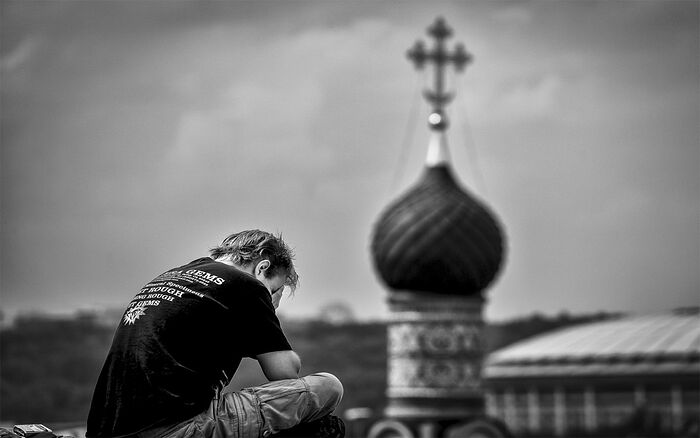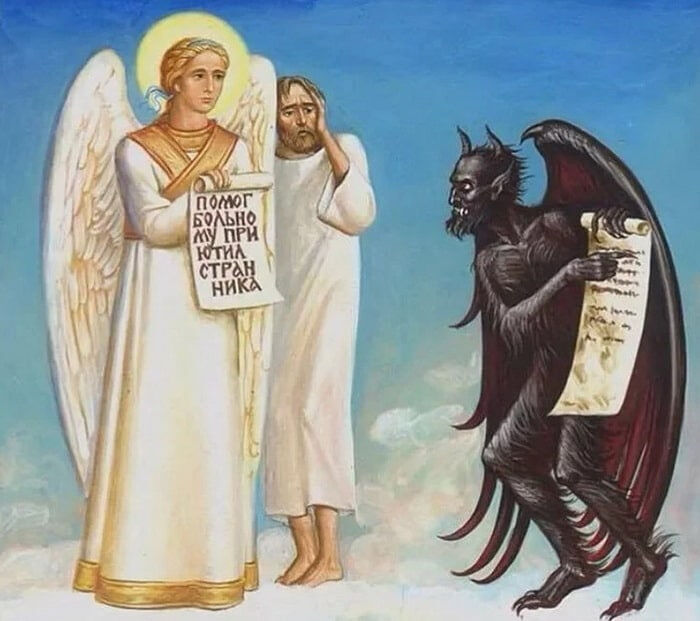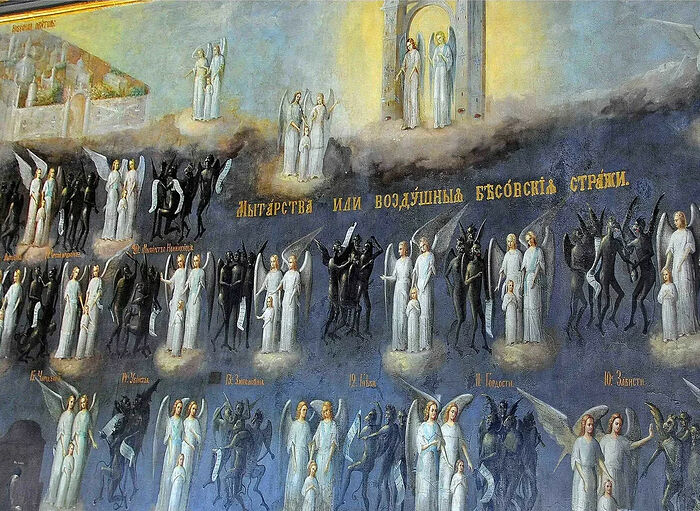THE SHACKLES OF DEATH. WHY IS THERE NO REPENTANCE IN HELL?
Part 3. “When the will is taken away after death”
 Photo: mykaleidoscope.ru
Photo: mykaleidoscope.ru
And now it’s time to return to where I began in this article. To the fact that the Lord Jesus Christ Himself in the parable of the wedding feast gave us an image of the “shackles” of sinners after death, warning us not to delay repentance. Let me remind you that Blessed Theophylact of Ochrid explains that the “shackles” symbolize that the powers of action of our souls will be bound:
“The Lord then says to His servants, the angels of punishment, Bind his hands and feet, that is, the soul’s powers of action. For in this present age is the time to act and to do, but in the age to come all of the soul’s powers of action are bound, and a man cannot then do any good thing to outweigh his sins.”
Venerable Arsenia (Sebryakova) makes herself very clear. She writes about the taking away of the will after death:
“As long as you live on earth, you cannot realize to what extent your spirit is enslaved and dependent on another spirit. You cannot fully know this, because you have free will by which you act when and as you want. But when that free will is taken away from you after death, the soul sees to whose power it is enslaved. The Spirit of God brings the righteous into the eternal abodes, enlightening them, illuminating them and making them like God. But the souls which were in communication with the devil will be possessed by him.”1
St. Simeon of Thessalonica connects freedom of choice, possible only in this life, with the possibility of repentance:
“Here we have time to make amends for our transgressions, as long as we have freedom of choice; and then there will be one time—of separation and retribution for what everyone has chosen for himself. Let none of those who are possessed by sins or by any delusion (in order to justify or delight themselves) deceive themselves with such delusions; the torments for the unrepentant are eternal. This is why repentance is possible to the last gasp. Indeed, if it benefited us there, it would not have been given to us here. And what wonder would the Savior’s economy of salvation have done if there were repentance or the end of torments there? Do you see the folly of the impious?”2
It should be understood that here we are not talking about the will in general, but about the part of the will by which we choose whether to repent of our sins or not—gnomic will. We’ll give a few words about what this is.
Priest German Kapten writes that St. Maximus the Confessor was the first to speak about the difference in human volitional abilities: about natural will that belongs to the essence, and gnomic will, which is the ability to make a reasonable choice.
“Natural will, in his opinion, was good after Creation and bore no evil. It is necessary for man to exist in this world, to regulate all human abilities, from vital ones—nutrition and breathing—to more subtle intellectual needs.
“St. Maximus interpretes Adam’s sin not as a legal crime, but as a gnomic choice that turned his mind away from God to uλη (materiality without any formalization).
“St. Maximus the Confessor shows that the free choice of evil corrupted the essence of the unrepentant sinner, and thus he cannot return to perfection. For the saint, the ontological place of corruption is the will, or rather, its fragmentation.
“Initially, Adam’s gnomic will was only a possibility, but after the fall, he and his descendants must constantly choose. Any choice involves torments—the experience of the very need to choose and the consequences of your decisions.”3
It can be assumed that the gnomic part of human will can exist only within the boundaries of time, and it cannot work in eternity. “The choice is possible, provided that there is time,”4 writes Priest German Kapten.
Archimandrite Raphael (Karelin) explains in detail the change of the human will after death, this power of the soul that is important for repentance:
“The words it [sin] shall not be forgiven him, neither in this world, neither in the world to come (Mt. 12:32) do not mean the severity of the sin committed, but your inner state that makes you unable to repent; and Whatsoever ye shall bind on earth shall be bound in heaven (Mt. 18:18). If you have not repented of your sins in your earthly life, you will not be able to repent in the afterlife either; sin will become your personal quality, and the afterlife for you will mean becoming like demons.”
Recalling the prophetic word, For in death there is no remembrance of Thee (Ps. 6:6), Archimandrite Raphael (Karelin) writes:
“These words mean the expression of your faith and belonging to a certain denomination. The soul of a non-believer or an adherent of another faith cannot accept the Orthodox faith after death in hell—that is, it cannot be born again. In the afterlife is revealed what constitutes the contents of the human soul, what was acquired in earthly life.
“In Patristic works, the same call sounds like the ringing of an alarm bell: to treasure the time of our life on earth, to treasure every day and hour, for after death it will be too late. The Apostle Paul writes that it is appointed unto men once to die, but after this the judgment (Heb. 9:27)—the particular judgment of the soul before the Last Judgment.
“In hell the human soul cannot help itself. There is no choice of confession or change of faith. Only the living who remain on earth and the Church itself by praying for the dead can help some to be saved, but under two conditions: firstly, if a person in question was Orthodox and belonged to the earthly Church; secondly, if he repented of his sins, did good works, but could not reform properly and died in an uncertain spiritual state when the good in his soul was mixed with evil. Then the Church can fill in what is missing without changing the direction of the personality itself. <…>
“St. Maximus the Confessor, a great Christian thinker, in his dispute with the Monophysites points out that two aspects can be distinguished in the human will: natural will as desire (the early Fathers called it the irritable power, and some modern theologians call it the reactive one) and gnomic will—the possibility of choice. St. Maximus the Confessor says that human freedom is put into practice through life in God, and then gnomic will is united with the natural one. When you are possessed by satan, you are enslaved, and your will is subject to self-corruption. This process of destroying gnomic will has its completion in hell… Man’s natural will remains in hell, but his gnomic will ceases to work, since faith—the kingdom of freedom—has become obvious, and the moral composition of the soul—static, which can be changed by the prayers of the Church, including private prayers. ... After death, unrepentant sinners will be determined by their sins…
“The earthly life of a sinner and his destiny after death... do not depend on his desire, but on his sins. In fact, a sinner says ‘yes’ or ‘no’ to temptations in his earthly life. Here gnomic will makes choices between good and evil, truth and falsehood, virtue and sin, grace and passions, God and satan. Here, free human will is in a state of the permanent possibility of choosing motives and decisions, but after death another process begins—the revelation of the moral potential that you have acquired. Here a sinner can only be helped from the outside—by the power of prayers and almsgiving, and only on condition of his faith in Jesus Christ, repentance, and the good works that he had time to do before death5.”
All the Holy Fathers say that repentance, which is salvific for us—the choice of a will that turns to God (Greek: “metanoia”, meaning “change of mind”)—is possible only in this life. There is no repentance after death. There the soul of an unrepentant sinner cannot receive the saving effect of grace, and his will becomes completely subordinate to sin, to which he submitted in his lifetime at his own choosing.
In conclusion, I will repeat that whatever our eternal destinies may be, we will see for ourselves that we created them ourselves with our earthly lives and chose them ourselves with our virtually daily choices. By choosing to obey the will of God or sin in both important and seemingly insignificant things, we create our eternity.
St. Justin (Popovich) writes that God does not violate our freedom, respecting the choice of the personality:
“Providence ... does not violate, destroy or block freedom, because it is a gift from God; a gift that is the essence of the nature of rational beings; a gift that makes them what they are; a gift given to them by God as their inviolable, inalienable and personal attribute... God, being invariably Good, does not destroy or limit the freedom granted ... the freedom of His creation always remains inviolable…
“If the will inclines towards evil, then Providence leaves it to act independently. <…>
“God does not eliminate evil in the world, since this would mean destroying the freedom of the rational and moral beings, with which He Himself endowed them. He does not prevent evil in the world, since otherwise He would limit the freedom of action of these beings… However, the fact that He allows sin must not be understood as God’s inattention to the destinies of created beings, but solely and exclusively as His desire not to infringe on their freedom and allow it to act, so that they may choose independently either good or evil, voluntarily moving towards the former or the latter.”6
People who chose evil in their lifetimes will remain in eternity with the fruit of this choice. Evil will reign in them, and God will remove them from Himself, because they have moved away from Him.
St. Irenaeus of Lyons explains the logic of the deprivation of salvation:
“And to as many as continue in their love towards God, does He grant communion with Him. But communion with God is life and light, and the enjoyment of all the benefits which He has in store. But on as many as, according to their own choice, depart from God, He inflicts that separation from Himself which they have chosen of their own accord. But separation from God is death, and separation from light is darkness. And separation from God consists in the loss of all the benefits which He has in store. Those, therefore, who cast away by apostasy these aforementioned things, being in fact destitute of all good, do experience every kind of punishment. God, however, does not punish them immediately of Himself, but that punishment falls upon them because they are destitute of all that is good. Now, good things are eternal and without end with God, and therefore the loss of these is also eternal and never-ending...”7
St. John Chrysostom writes about the righteousness of God’s judgment of those who don’t choose blessed deeds, but choose deeds deserving damnation:
“But to the others He saith, Depart from me, ye cursed (no longer of the Father; for not He laid the curse upon them, but their own works), into the everlasting fire, prepared, not for you, but for the devil and his angels. For concerning the Kingdom indeed, when He had said, Come, inherit the kingdom, He added, prepared for you before the foundation of the world; but concerning the fire, no longer so, but, prepared for the devil. I, saith He, prepared the Kingdom for you, but the fire no more for you, but for the devil and his angels; but since ye cast yourselves therein, impute it to yourselves.”8
In order for this tragedy not to happen to us the Lord gives each one of us a life, time and freedom of choice. And the price of this choice is eternity.
2/24/2024
1 St. Arsenia (Sebryakova) of Ust-Medveditsky. Letters. Letter 45.
2 St. Simeon of Thessalonica. Commentary on the Divine and Sacred Creed of Our Orthodox and Immaculate Christian Faith.
3 G.Yu. Kapten. Criticism of Origenism in the Philosophy of St. Maximus the Confessor.
4 Ibid.
5 Archimandrite Raphael (Karelin). On Modern Neognosticism.
6 St. Justin (Popovich). Dogmatics of the Orthodox Church.
7 Hieromartyr Irenaeus of Lyons. The Denunciation and Refutation of Pseudo Knowledge (Against Heresies). The citation source: https://www.newadvent.org/fathers/0103527.htm
8 St. John Chrysostom. Homilies on the Gospel of Matthew. The citation source: http://ww1.antiochian.org/node/17259
thanks to:
https://orthochristian.com/158815.html

